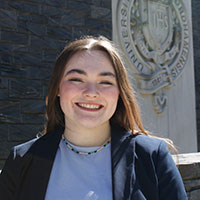The annual tradition was also celebrated at the University Church at Rose Hill on Dec. 8, bringing together voices from the combined University choirs and the Bronx Arts Ensemble. President Tania Tetlow lent her own voice to the festivities, joining the choir singers and performing a solo of “Angels We Have Heard on High.”
St. Paul the Apostle, Lincoln Center
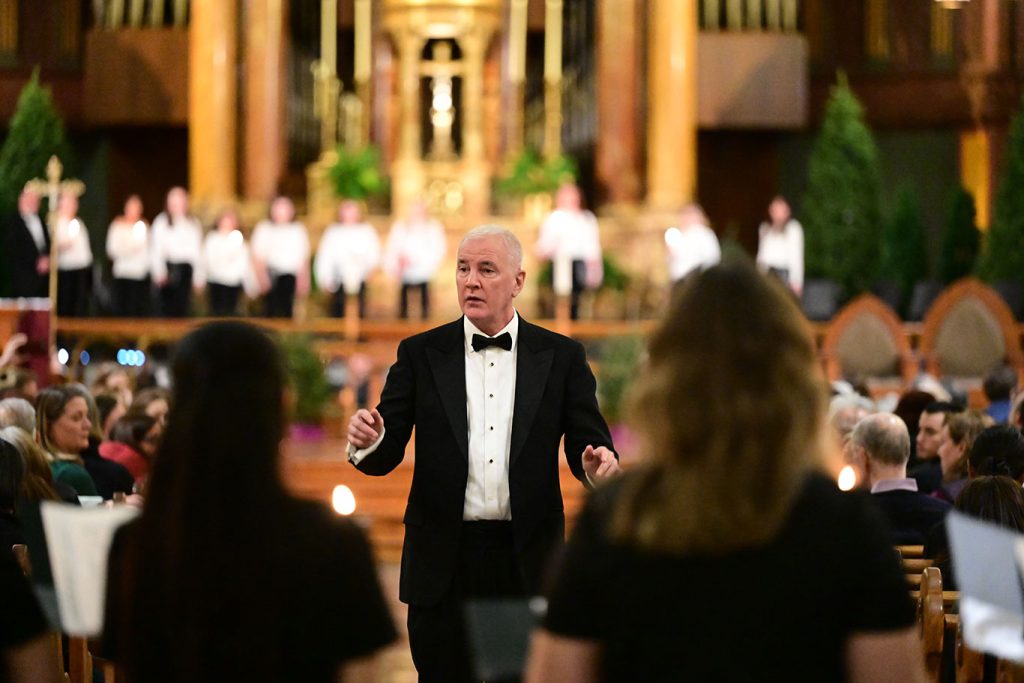
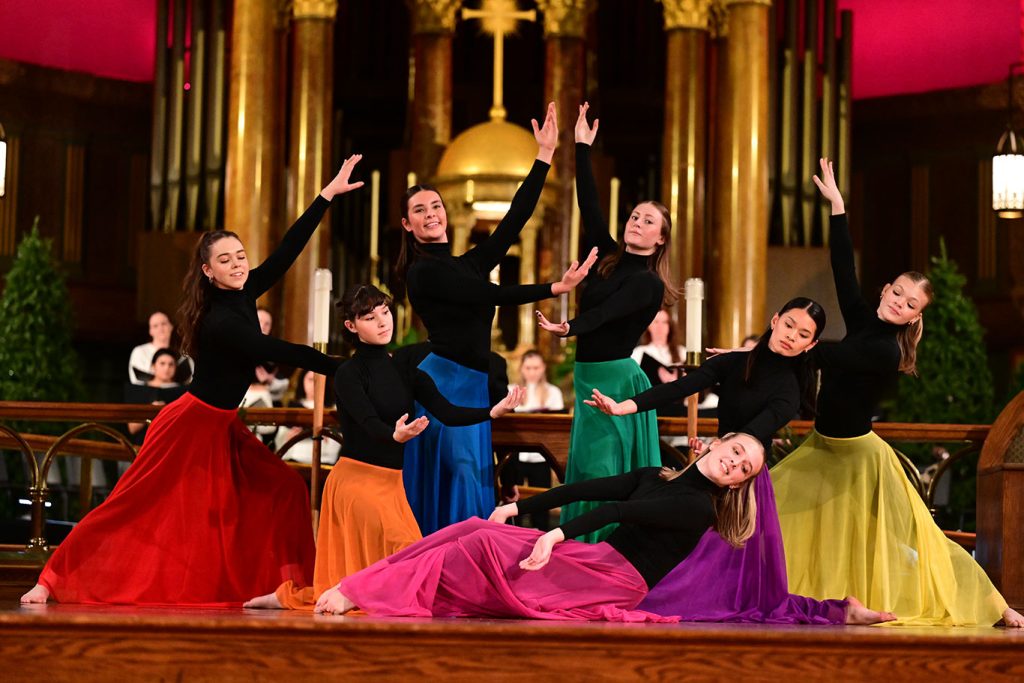
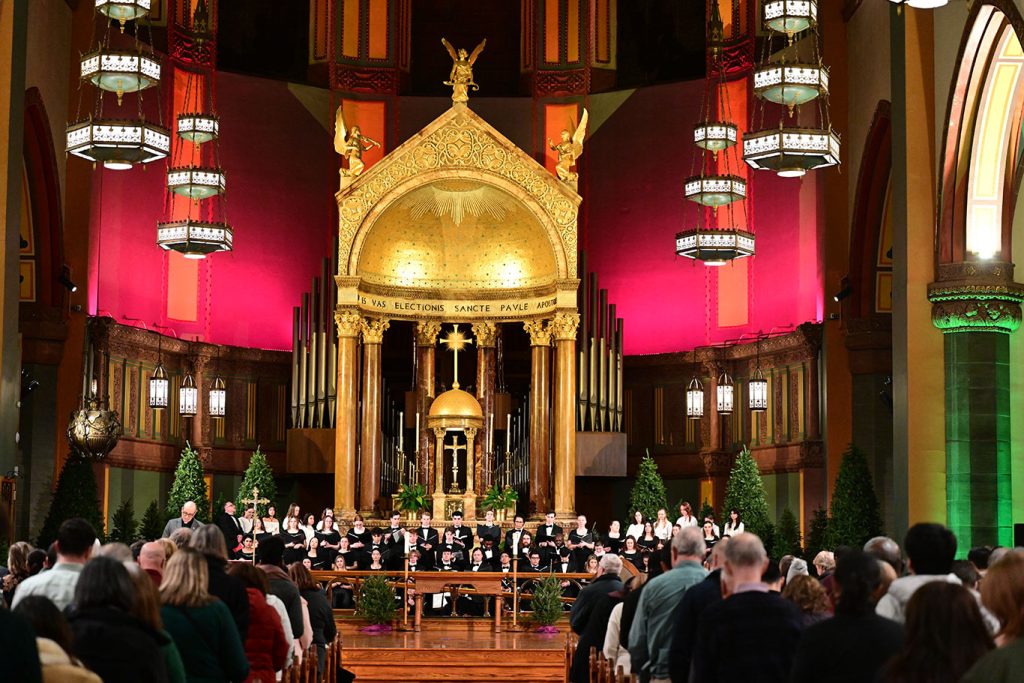
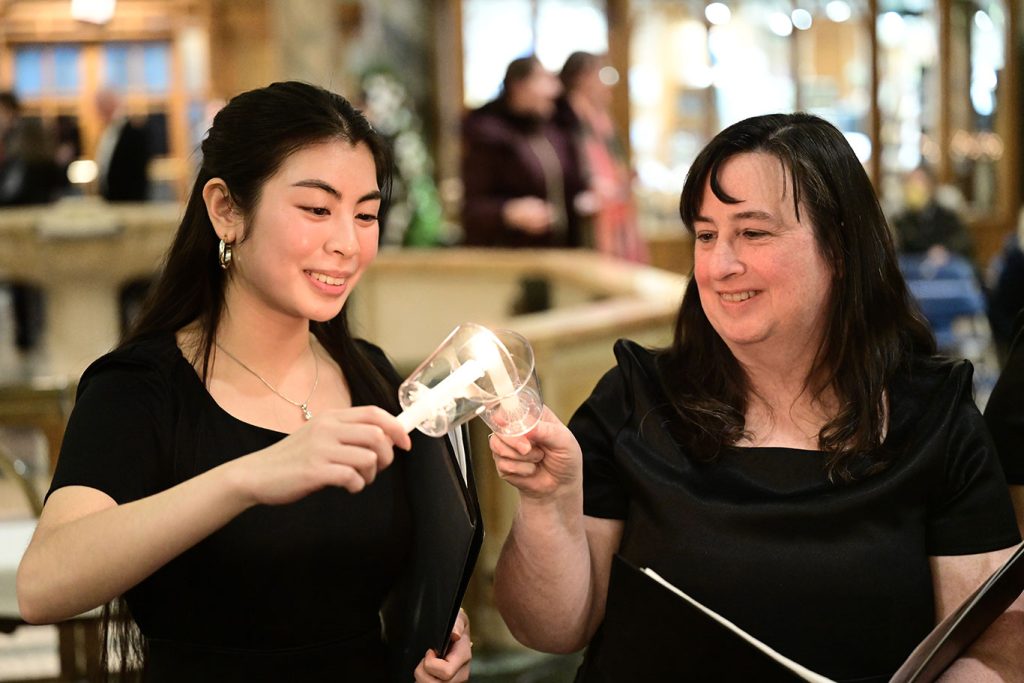
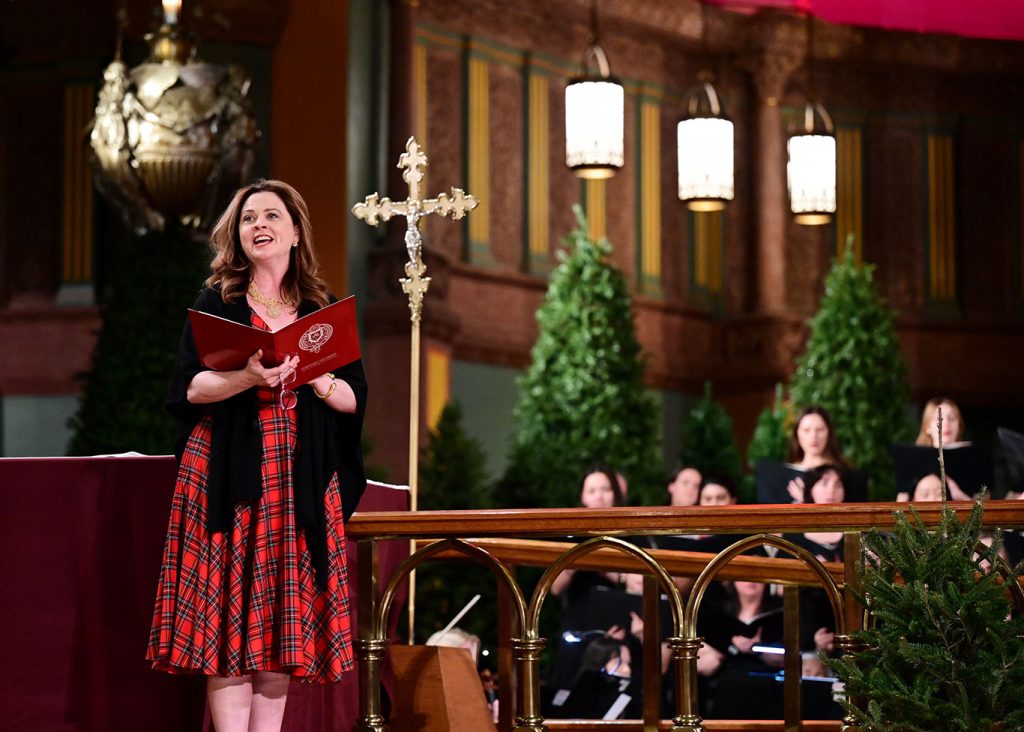
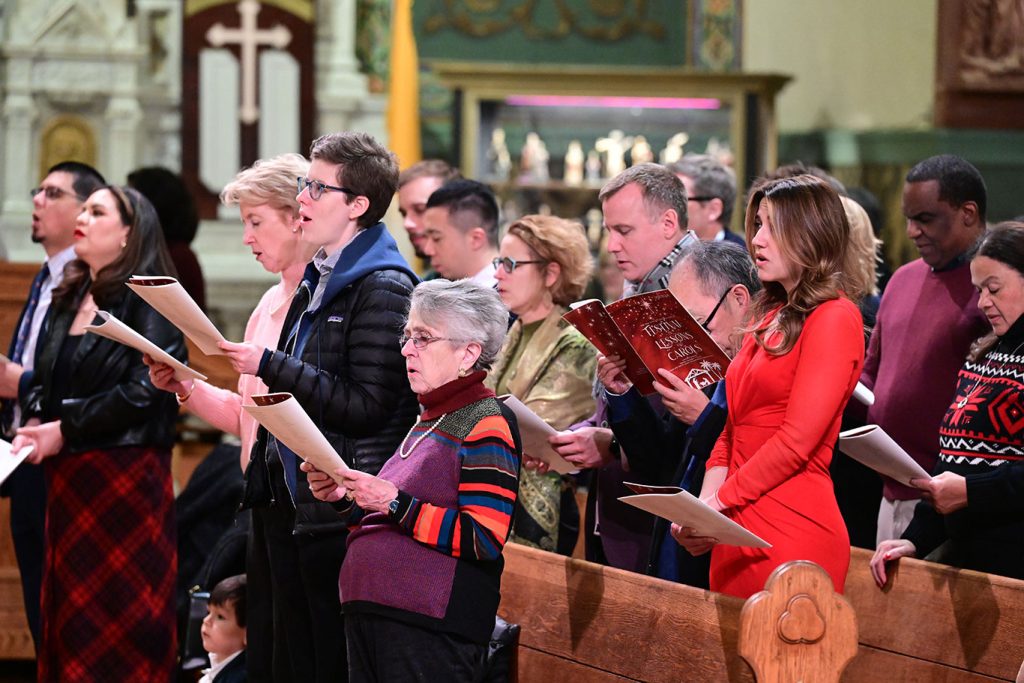
University Church, Rose Hill
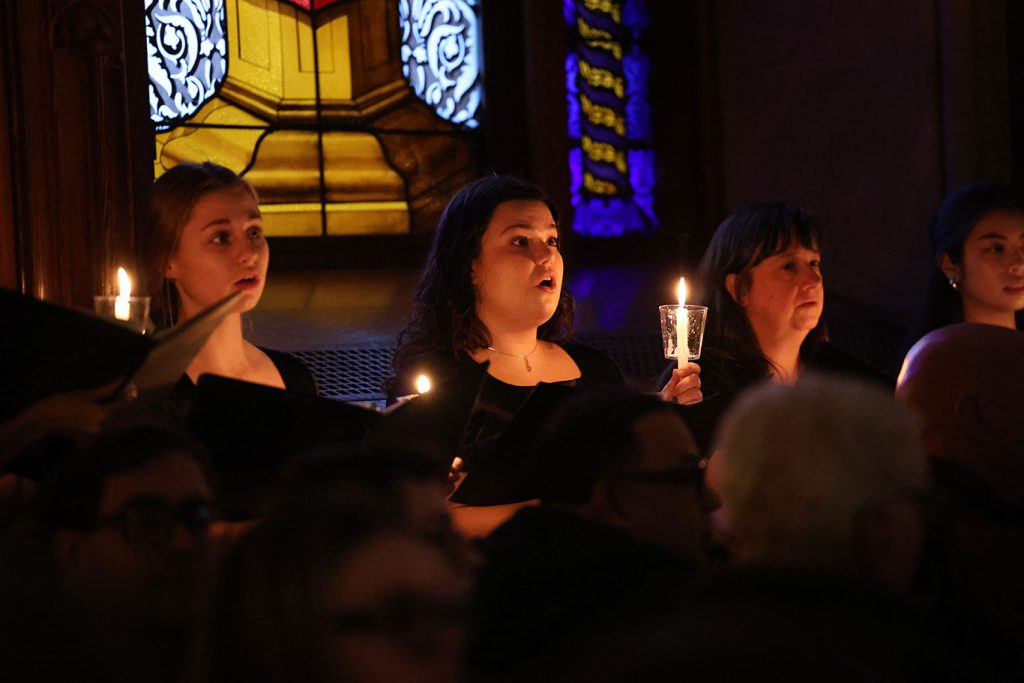
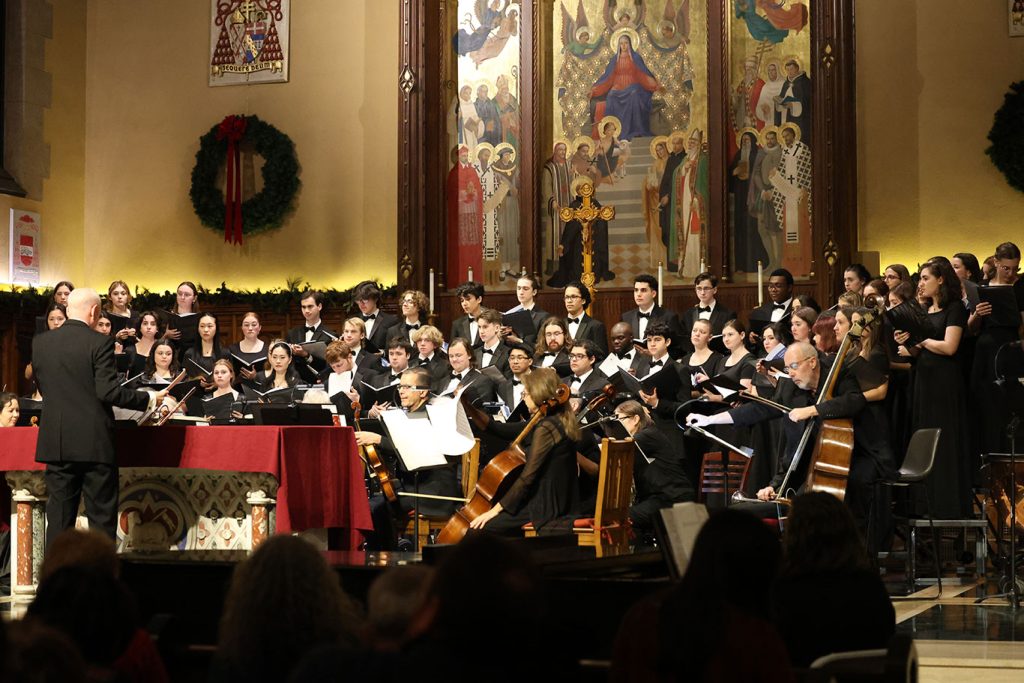
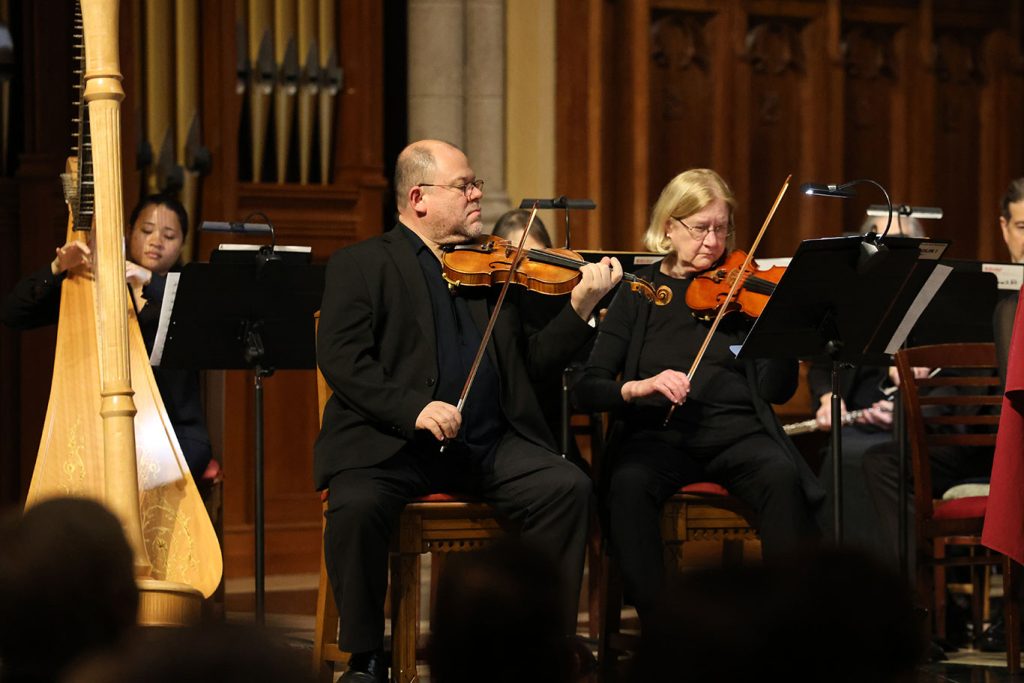
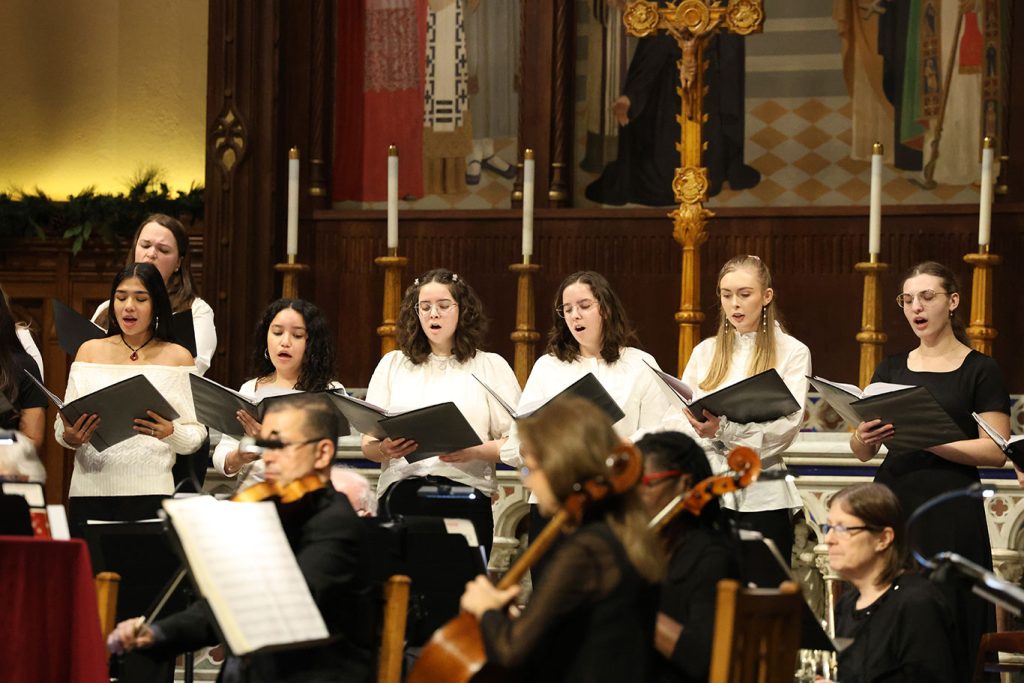
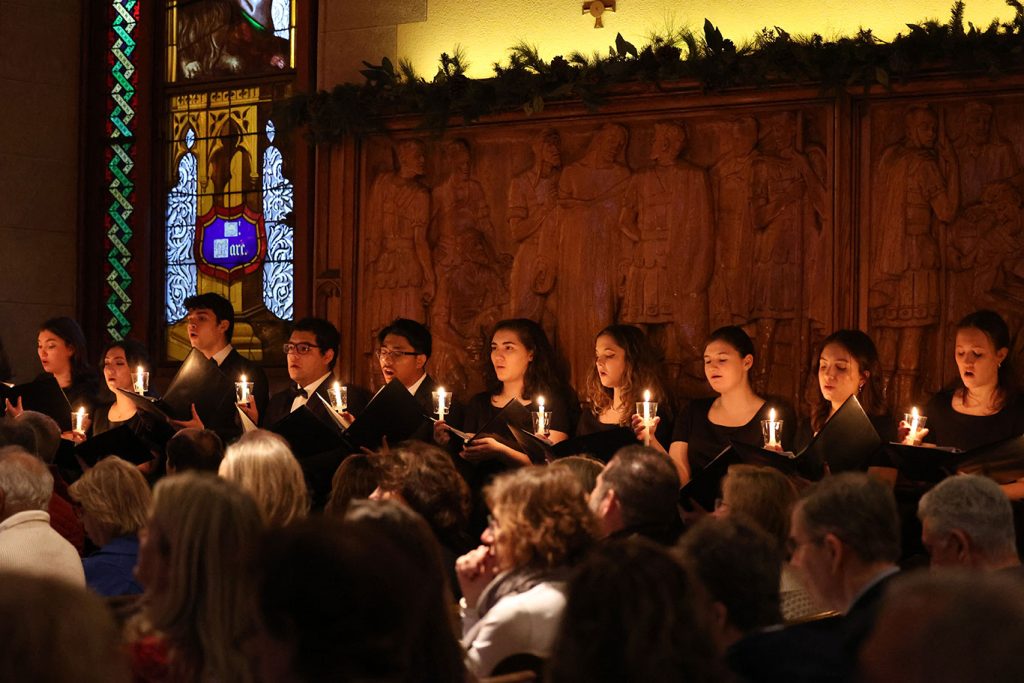
Tonight, the Jewish members of our community and their families and friends will gather around their dinner tables for a festive meal to celebrate Rosh Hashanah, the Jewish New Year. Many will dip apple slices into honey or eat yehi ratsones (symbolic appetizers), laugh, reminisce, and look ahead. Rosh Hashanah invites introspection and celebrates the creation of the world. It also opens the Days of Awe, traditionally a period of intense soul-searching leading up to Yom Kippur, the Day of Atonement and the holiest day in the Jewish calendar, when we fast for 25 hours and reflect on our fragility and morality to hopefully become more open-hearted, loving, and connected.
To me, Rosh Hashanah means decorating my home with pomegranates, shared meals, and an expectant hush going through the synagogue as the cantor raises her voice for morning prayers. Every year, I feel myself sink anew into this wall of words and sounds—and always the shofar, the ram’s horn, this ancient instrument whose sharp voice seems to peer straight into my heart, reaching me where words cannot. The shofar stirs my soul and reminds me that the time has come to make amends and to reconnect with the divine, with those around me and myself. This poem by Shoshanah Tornberg captures what the shofar can mean.
Hearing the shofar is so central to Rosh Hashanah that in 2020, when we could not be together, local synagogues organized a communal shofar blowing ritual on Broadway that reached all the way from 64th Street to Columbia University on 116th Street. At almost every corner, young and old gathered around a shofar blower, often with tears in their eyes and giddy with excitement, to hear the shofar and to feel the holiday.
This year, almost a year after October 7, this may feel particularly difficult. There are still hostages remaining in a now destroyed Gaza, the suffering of innocent Israelis and Palestinians is ongoing without an end in sight, and elections are looming here in the United States. A lot of hurt and anger may have accumulated. And yet my hope for all of us is that we can, if only over the bread we break, or the moments of the shofar, connect to whatever is that matters in our lives so we may be agents of healing and peace in our communities.
Shanah tovah umetukah, anyada buena, dulse i alegre—may we have a good, sweet, and happy New Year.
Rabbi Katja Vehlow, Ph.D.
Director of Jewish Life, Campus Ministry
Dear President Tetlow; Father Rector; professors, staff, and students; dear friends,
The page of the Gospel that has just been proclaimed is part of the itinerary of Jesus toward Jerusalem, which unfolds as a succession of teachings and recommendations.
The question posed by John: “We saw someone driving out demons in your name, and we tried to prevent him because he does not follow us,” describes well the rigid pattern within which they, like us, would like to imprison the freedom of the Spirit, who always blows where and how he wills.
It is interesting to note that in the previous passage the disciples divided themselves from each other in the name of their individual “I.” Here they separate from others in the name of their collective “we.” One’s own name, whether individual or collective, is the principle of division; only the “Name,” only the “Name,” which is the name of Jesus, is a source of unity among all.
We all know that he who loves enjoys the good of others, while the egoist does not enjoy the good, but only his own possession, and hurts the good of others. Egoism produces suffering proportional to suffering. Through it, death entered the world.
Selfishness, envy and pride can have both the personal and collective forms. The latter, much more harmful, can grow so vast and apparent that it turns invisible to the individual, who can continue to live by dedication, service, and humility towards his “we”—like a bandit remains loyal to the gang.
Our true unity is to go after Him, who leads us out of all fences and opens us to others, starting with the most distant and excluded. Being with Him, the Son, unites us to the Father and to our brothers and sisters, and forms a “we” that is not confined by a hedge of ownership, but driven by an internal drive of sympathy towards all.
In the name of Jesus, the church embraces everyone and excludes no one. This means that no one in the church can remain anonymous—that is, without, or even worse, not in Jesus’ name, and consequently without knowledge of him. In other names, personal or collective, ghettos, partisan spirits, sects and exclusions are born.
But he who excludes one, excludes Him who has made himself the last of all. In doing so, he fails to be Catholic, universal, and even Christian: He does not yet have the Spirit of the Son who, knowing the Father’s love, died for all brothers and sisters.
The stronger our union with Him, the stronger the unity among us. This unity in full freedom—our our own and that of others.
The disciples form a community, a “we,” which is the church. Yet, the church does not have its centre in itself. It does not take a census to feel strong, nor does it seek its own glory. It serves only the Lord, and is open to all, with willingness and humility.
As long as it seeks unity in Him, it is one and remains free, liberating and Catholic. However, it must always beware of collective pride, typical of the weak that becomes gregarious. This is how divisions arise among believers who consider themselves better and more faithful to the truth, thinking they have God with them.
We Christians are not the masters of salvation, given to us by Christ. Although we have different responsibilities or better vocations within the church, we Christians only have the task of making the person of Christ encounter, among ourselves and others, through our witness, our word, and our actions.
As Christians we are called to follow the example, the teaching and the generosity of Jesus, who assures at that the simplest deed done for Him or His Kingdom will not go unrewarded even if it is as simple and natural as giving a glass of water to someone who is thirsty.
Unfortunately, too often we behave like the Apostles in this passage—we are less generous than our Lord. We are less generous than our Lord. Even worse, our one concern becomes the hoarding of the grace of God, refusing to give freely what we received freely. Sometimes, we even envy the good done by others, as if their good deeds diminish our own or make us appear less virtuous. Our duty as Christians is to extend to others the grace we have received and to encourage the good that is being done, regardless of whether we receive credit for it.
There is a latin proverb that says: bonum diffusivum est sui, that is, goodness spreads itself. God, in His nature, shines with goodness, and spreads goodness. He is always surrounding us with signs of His love, always seeking to fill our hearts with wisdom, grace, mercy, and virtue.
But if Jesus is so generous, why do we so often fail to experience His generosity? If God’s goodness is like the sun, shining brightly and constantly all around us, why do we so often find ourselves in darkness, sadness, and difficulty?
Often, we fail to see God’s light shining in our lives, because we don’t bother to open the shutters. It can be a bright, beautiful day outside, but if we lock ourselves up in our room behind closed shutters and drawn curtains, we will not benefit from the light.
God is respectful of our freedom. He wants our friendship, not blind obedience. He gives us countless opportunities and instruments to receive His generous grace, but He does not force us to use them. He gives us the Sacred Scriptures, the gift of prayer, the sacraments of the Eucharist and Confession, each one of which is a flowing fountain of grace and spiritual strength—but it is up to us to come frequently and drink deeply from this spring.
Dear friends, God is generous, and His infinite generosity calls for openness and unity, including within the Fordham community. On your website, one can read that one of your core principles is to care for others. The Gospel reminds us not to hinder those who do good in His name and to stay vigilant over our own hearts. The Holy Spirit desires welcoming communities, and Fordham, as a Catholic university following the Jesuit traditions in this city of New York, is uniquely positioned to appreciate and foster the creativity with which God acts.
As we experience God’s generosity in this Holy Mass, let us therefore thank Him from the bottom of our hearts and seek the grace and courage to open the shutters of our souls, embracing openness and support.
Nothing would please Him more. Amen.
]]>Throughout her time at Fordham, senior Olivia Griffin has been passionate about protecting the environment while supporting native communities. Now the Udall Foundation is recognizing her as a future leader in the environmental space.
Griffin is a recipient of a 2024 Udall Undergraduate Scholarship, a highly competitive award for scholars building impactful careers in environmental protection, tribal public policy, or health care. The tribal public policy and health care tracks are only awarded to Native American and Alaskan Native scholars, while the environmental track that Griffin earned is open to all, meaning the competition is fierce. Out of 341 applicants in the environmental category, she was one of 37 who received the scholarship.
The benefits of the scholarship include $7,000 for academic expenses, connection to a vibrant alumni network, and a four-day orientation in Tucson, Arizona. Griffin especially enjoyed meeting fellow Udall scholars at the orientation this summer and listening to lectures about indigenous ecological knowledge.
When she learned her application was successful, “I was ecstatic,” Griffin said. The scholarship is just her latest award — she also earned Fordham’s Trinity Financial Fellowship in Urban Studies for 2024.
Connecting with Native Heritage and Mother Earth
Griffin grew up in Oklahoma City and is a member of the Cherokee Nation. She says she feels a strong link to the environment that stretches all the way back to her ancestors. She recalled a passage from Robin Wall Kimmerer’s “Braiding Sweetgrass” that illustrates this connection.
“It’s a pretty well-known creation story that varies from tribe to tribe of this sky woman falling down to the Earth and all the animals that help her with her landing. She brings these seeds down, and she creates the planet, sort of like a Mother Earth character,” said Griffin. “Tied into Indigenous origin stories is this inherent sustainability and care for the Earth.”
Environmental Advocacy at Fordham and Beyond
Griffin is a member of the Fordham College at Rose Hill Honors Program, pursuing a degree in Urban Studies with a minor in English. She’s also a member of the United Student Government at Rose Hill Sustainability Committee, where she plans events like cleanups and educational seminars and a member of Students for Environmental Action and Justice.
Griffin has interned with Cherokee Federal, where she helped manage Federal environmental projects. The scholarship is making it possible for her to continue gaining valuable experience in the field alongside her studies. As part of an internship with Youth Ministries for Peace and Justice, she’s started working with Bronx community members to study and address brownfield sites, former industrial areas contaminated by pollutants that can pose risks to human health.
“The scholarship will help to cover my expenses since the nonprofit can’t pay me. That will definitely help compensate some of my work,” she said.
A Rising Star in Sustainability
After graduation, Griffin plans to work for a few years before pursuing a master’s in urban planning at a school with a focus on indigenous planning and resource management.
Combining urban planning, environmentalism, and tribal studies makes for a rare specialty, but Griffin hopes other scholars will follow in her path. “I’d like to see how my experiences and knowledge could help the Cherokee Nation, but also in a broader sense,” she said.
—Alex Williamson
]]>They are: Marcel Chotkowski LaFollette’s Writing for Their Lives: America’s Pioneering Female Science Journalists (MIT Press, 2023); Santi Elijah Holley’s An Amerikan Family: The Shakurs and the Nation They Created (Mariner, 2024); Jane Ferguson’s No Ordinary Assignment: A Memoir (Mariner, 2023); Alan Philps’, The Red Hotel: Moscow 1941, the Metropol Hotel, and the Untold Story of Stalin’s Propaganda War (Pegasus Books, 2023); and Ari Shapiro’s The Best Strangers in the World: Stories from a Life Spent Listening (HarperOne, 2024).
Honoring a Storied Biographer
The Sperber Prize is given in honor of the late Ann M. Sperber, the author of Murrow: His Life and Times, the critically acclaimed biography of journalist Edward R. Murrow. One edition of that work was published by Fordham University Press, connecting the Sperber family to the university.
Through the generous support of Ann’s mother, Lisette, the $1,000 award was established to promote and encourage biographies and memoirs that focus on a media professional. It has been presented annually by Fordham University’s Department of Communication and Media Studies since 1999.
Professor of Communication and Media Studies Amy Aronson, Ph.D., director of the Sperber Prize, said the five finalists emerged from a pool of 48 titles considered for this year’s award. The winner will receive a $1,000 prize and be invited to keynote a public award ceremony held at Fordham’s Manhattan campus on November 11. The 6 p.m. event is free and open to the public.
“Our finalists take readers to profound encounters in less-traveled corners of the U.S. and the world,” Aronson said.
“They take us behind the front lines in dangerous conflict zones, reveal hidden stories of journalistic risk-taking, and into carefully researched biographies of public visionaries. All show us the vital importance of journalists and media voices in the world today.”
Previous winners of the Sperber Prize include Working by Robert Caro, Fire Shut Up in My Bones by Charles M. Blow, Cronkite by Douglas Brinkley, Lives of Margaret Fuller by John Matteson, Reporter by Seymour M. Hersh, The Publisher: Henry Luce and His American Century by Alan Brinkley, Avid Reader: A Life by Robert Gottlieb, and All Governments Lie! The Life and Times of Rebel Journalist I.F. Stone by Myra MacPherson. The most recent winner was The Newspaper Axis: Six Press Barons Who Enabled Hitler by Kathryn Olmsted.
The Finalists
LaFollette’s Writing for Their Lives profiles the first generation of women reporters who worked for Science Service, the first news organization in the country dedicated entirely to scientific journalism. LaFollette, author of Science on American Television, reveals that when the Service began in 1921, very few journalism organizations covered science at all, and those that did treated the subject cavalierly, putting any science hobbyist already on staff onto the rare stories deemed important enough to cover. They were all male hobbyists, of course. LaFollette explores how an aspiring and ambitious group of women writers confronted pervasive sexism and gender discrimination to create meaningful careers for themselves while developing a new and increasingly crucial journalistic beat.
Tupac Shakur, the late rapper who was killed in 1996 at the age of 25, was the “spark” for Holley’s An Amerikan Family, which explores the story of the Shakur family and their work for Black liberation in America. Some may be familiar with the rapper’s mother, Assata Shakur, the activist and writer for the Black Panther Party newsletter, living for three decades in Cuban exile, and many have come to know at least something about the iconic Tupac, her son. But Holley, a writer published in the Atlantic, New Republic, Economist, Guardian, and Washington Post, reveals that the branches of the Shakur family tree spread widely and ran deep into the underground of the civil rights struggle. The book is both a family genealogy and a larger story of one community’s struggle for racial justice, taking extreme, unconventional, and often perilous measures in that quest.
Ferguson’s No Ordinary Assignment is the memoir of a journalist who has covered nearly every war and humanitarian crisis of our time. A correspondent for PBS NewsHour, Ferguson was in Yemen for the Arab Spring. She managed to report from rebel-held Syria during its civil war despite the ban on foreign journalists. She was one of the last reporters to remain in Afghanistan when the Taliban claimed Kabul in 2021. Born and raised a Protestant in Northern Ireland during the Troubles, Ferguson is no stranger to sectarian violence or grave suffering. Her debut book chronicles the story of a remarkable woman coming into her own in the world’s most perilous and devastating circumstances as she dares to tell the hardest stories on earth as an act of justice.
Philps’ The Red Hotel takes readers inside the experiences of a cadre of American, British, and Australian journalists who reported from Moscow when Hitler invaded Russia in the summer of 1941. They were allowed to stay and report on the war at the Eastern front – as long as their stories were flattering to the Stalin regime. To help ensure this impossibly good press, they were billeted at the luxurious Metropol Hotel and supplied with bottomless vessels of vodka, lavish banquets, and young Russian secretaries and translators who were spies and sometimes prostitutes. Philps, who served as Moscow correspondent for Reuters and foreign editor of the Telegraph, reveals that while many of the translators conveyed Kremlin disinformation, some were dissidents who whispered to reporters about the truth of Soviet life and Stalin’s lies.
Shapiro’s The Best Strangers in the World takes readers around the globe to reveal the stories behind the sometimes heartwarming, sometimes heartbreaking narratives he reports to his listeners. The co-host of NPR’s All Things Considered, this book, his first, takes readers from Turkey to Ukraine to Indonesia to Northern Iraq; from drag shows in Florida to the corridors of power in Washington, DC; from war-torn locales in the Middle East and Africa as he follows the paths of refugees fleeing conflict to big cities and small towns. The result is a memoir-in-essays that is a love letter to journalism and a look at scores of individuals who not only refuse to break but also manage to confront life’s ugliness with beauty, meet horror with humor, and smile in the face of whatever might come next.
For additional information, questions, or press inquiries, please contact Amy Aronson at [email protected].
]]>Dear Fordham Community,
Juneteenth is short for June Nineteenth, and it commemorates the day federal troops arrived in Galveston, Texas, in 1865 to enforce the 1863 Emancipation Proclamation’s abolition of slavery in confederate states. Long before Juneteenth became an official federal holiday in 2021, African Americans in Texas and beyond honored the promise and complexity of the day. Juneteenth represents the promise of a future of full equality while recognizing the longstanding struggle in pursuing a true multiracial democracy. Indeed, each Juneteenth from 1865 to the present has witnessed the bittersweet recognition of racial progress accompanied by violent resistance.
Consider that Juneteenth originates in the simultaneous celebration of slavery’s abolition along with the recognition of the opposition to freedom that caused a more than two-and-a-half-year delay in its legal enforcement, including the two-month delay following the conclusion of the Civil War. Thereafter, the creation of the constitutional right to be free of slavery (13th Amendment) and the right to equality (14th Amendment) were quickly followed by legally imposed barriers to the constitutional promise of racial justice. The structural obstacles included racially imposed prohibitions on property ownership, freedom of movement, voting, employment, and much more. This year’s Juneteenth is witness to the joy of seeing Justice Ketanji Brown Jackson in action as the first Black woman on the Supreme Court, at the same time that the Supreme Court imposes severe constraints on the use of programs of racial inclusion like affirmative action in its SFFA v. Harvard decision. Bittersweet indeed.
For this reason, the domestic Juneteenth holiday resonates with many communities and global social justice movements. People fighting for freedom across the globe value the importance of celebrating social change while also acknowledging the continuing resistance to that change. In the midst of so much global turmoil, let us commemorate Juneteenth, like so many civil rights warriors of the past, by honoring the complexity of celebrating the racial progress that exists while remaining vigilant to all the ways that more work needs to be done.
In Celebration and Contemplation,
Tanya Katerí Hernández
Archibald R. Murray Professor of Law
Associate Director, Center on Race, Law and Justice
Fordham Law School
Dear Fordham Community,
As we commemorate Memorial Day with our families and friends, we should remember the meaning of this day beyond the barbecues and festive gatherings. This day is a solemn occasion honoring the brave veterans who have laid down their lives in service to our nation—“the last full measure of devotion,” in President Lincoln’s phrase. It is a time to reflect and acknowledge their courage and commitment, and to express our deepest gratitude for their ultimate sacrifice.
Among these heroes, we remember our own with special reverence: the many veterans of the Fordham community, including distinguished Medal of Honor recipients. One exemplary recipient is Navy Lieutenant Vincent Robert Capodanno Jr., FCRH ’52, a Catholic priest, Maryknoll missionary, and Navy chaplain, who served with valor and distinction during the Vietnam War.
On September 4, 1967, in the face of withering enemy fire, Father Capodanno, while mortally wounded, demonstrated extraordinary heroism and selflessness as he administered medical aid and last rites to his wounded and dying marines. For his actions, our nation posthumously awarded him the Medal of Honor, the highest military honor, a testament to his bravery and devotion. The Catholic Church has declared him a Servant of God, the first step to canonization as a saint.
The legacy of individuals like Father Capodanno serves as a powerful reminder of the values we hold dear: courage, selflessness, love for one another, and unwavering commitment to the greater good. Their stories are not just a part of our history; they shape our identity and live in our collective memory. As we honor these heroes, let us also renew our dedication to the principles they fought to protect.
On this Memorial Day, I encourage each of you to take a moment to remember and honor our fallen service members. Reflect on their sacrifices, share their stories, and ensure that their legacy lives on. Let their courage inspire us to strive for a better, more just and equitable world, and let their memory be a guiding light for future generations.
In gratitude and remembrance,
Marco Antonio Valera
Vice President for Administration
Commander, United States Navy, Retired
“I thought I should get proper professional experience and a business school education,” Patel said, adding that he gained even more than he imagined when he began his M.B.A. experience. “I learned how to work as a member of a team, and I would have to participate and present in a class. This was very new to me. I was put into situations that I would not normally be exposed to, and [that]has boosted my confidence. I learned about everything in such a structured and precise manner, exactly how it should be.”
Patel earned his undergraduate degree in geology at the M.G. Science Institute at Gujarat University, a typical field that interested him and would prepare him to join the civil services in India. However, after working at Shree Umiya Developers, the company his father established, his vision for his future changed. Serving as general manager, Patel assisted in the completion of a luxury bungalow project and, when each of the 21 properties sold, he knew the experience was the first step toward his new career journey.
Patel notes a few M.B.A. courses that are particularly relevant to his next chapter. Strategic Branding not only focused on “how to build a brand, but how to differentiate it,” valuable skills he will use to grow the real estate development business. In Marketing with Cultural Intelligence, Patel discovered how different modes of marketing appeal to different cultures. This enlightenment came from learning specific practices that cater to Indian consumers and clients, which inspired him to reflect upon his own culture from a marketing perspective.
“When I would visit Indian grocery stores, I would just go as a consumer, and I would not think why this item is placed here, and how it is different from the American way,” he explained. “After this class, my understanding of marketing within my cultural context deepened.”
Patel took advantage of many opportunities to build his leadership skills as an M.B.A. student. As the president of the Student Advisory Council, he and his team worked to enhance the student experience and campus culture by coordinating events, balancing budgets, and serving as a liaison between students and the School’s administrators.
An accomplished equestrian who enjoys adventure sports and the outdoors, Patel looks forward to life in North Carolina and to his new role that will keep him connected to family and friends from India.
“I am lucky to have my own family business here,” he said, adding that while he is excited for the next chapter in his career, he will miss the home he found at the Gabelli School of Business. “For one and a half years, I’ve been used to the Gabelli School way of living, meeting people, studying, attending events, and everything else. I will miss that when I [leave]for North Carolina.”
– Written by Gabrielle Simonson for Fordham Business Magazine
Remember, on the evening of May 18, New York’s Empire State Building will be illuminated in Fordham maroon for our graduates.
]]>At first, Farrell was concerned about the new format, but when she began studying, her apprehension was quickly replaced with confidence.
“My biggest fear was that I was going to go in knowing absolutely nothing, and that could not have been further from the truth,” she said, adding that so far, “every single accounting class” she’s taken at the Gabelli School is reflective of the new exam content.
Farrell took the exam’s Financial Accounting and Reporting section in March, and has three more sections to go. In December 2023, she completed her bachelor’s degree in accounting information systems and is now working toward her master’s in professional accounting. She enrolled in the Gabelli School’s 4+1 program to complete both degrees in under five years.
Farrell also secured a position with a “Big Four” accounting firm—PricewaterhouseCoopers—which she’ll begin in January. This highly coveted opportunity was the result of a successful internship in the firm’s external assurance division.
“I’m excited because it’s such a great company, she explained. “They take a genuine interest in the interns and I formed so many connections in the time I was there. I’m thrilled to be doing meaningful work—helping ensure the integrity of financial statements that are going to get issued—and doing it at a firm where the values and people resonate with me.”
As a woman in accounting information systems, the job stability and integration of cutting-edge technology are part of what attracted Farrell to the field.
“I honestly don’t know why more women aren’t drawn to this field,” she said. “Women can be very organized, and I found that the characteristics of being organized and analytical aligned with both accounting and myself.”
While Farrell’s decision to apply to Fordham’s Gabelli School was an easy one—she grew up in nearby New Jersey and liked the idea of studying business in New York City—she wasn’t sure what career path to pursue. That changed after her first accounting class when she realized that she had a natural aptitude for accounting and technology.
As an undergraduate, Farrell served as the president of Beta Alpha Psi, the honor society for accounting, finance, and information systems, and was a member of Smart Woman Securities, where she placed first in a stock-pitch competition. She also was a teaching assistant in the Gabelli School’s Ground Floor course for first-year business students, a freshman advisor, and a member of Fordham’s women’s club soccer team throughout her undergraduate years.
Farrell is the fourth member of her family to find her place in accounting, following her father, James Farrell, GABELLI ’98, and mother, both CPAs, and her sister who also works in the field.
“Ever since I left high school, my parents said, ‘The world’s your oyster. Whatever you want to do, just do it,’” Farrell said. “They’re so supportive. They think there are no limits to what I can do.”
—Written by Gabrielle Simonson for Fordham Business Magazine
Remember, on the evening of May 18, New York’s Empire State Building will be illuminated in Fordham maroon for our graduates.
]]>Dear Fordham Community,
At the stroke of midnight last night, Orthodox Christians around the world stood in darkness, anticipating the reception of the Paschal light and the first acclamation of Christ’s Resurrection: “Come receive the light, from the never-setting light; and glorify Christ who has risen from the dead.” After 40 days of Lent, which called all Orthodox Christians to reorient their lives toward God through prayer and fasting, and a Holy Week that recounted the saga of Christ’s life, death, and Resurrection, Orthodox Christian faithful now, with our Catholic and Protestant neighbors, can joyfully cry:
Christ is Risen! Truly He is Risen!
Pascha, colloquially Orthodox Easter, is calculated according to the Julian calendar and thus does not, generally, coincide with the Paschal celebrations of other Christians around the world. Like all Orthodox Christians, I have lived with this near annual divergence in commemorating the Feast of Feasts for my entire life. I have come to see this particular reality as an unintended, yet somehow beautiful reaffirmation of the fact that every Sunday is a Paschal celebration. Every Sunday is then the new day, filled with light, hope, and possibility.
As Orthodox Christians raise, quite literally, the Paschal light in triumph of life over death, hope over despair, and freedom over bondage of all kinds, it should not be forgotten that at its core, Pascha is an ecstatic and emphatic declaration that humanity has been, is being, and will always be transformed for the better by love. While this blessed day draws to a close, our joy will not be extinguished, as we all carry the light of new life in our hearts whenever we endeavor to cultivate lives of hope, love, and joy.
Truly, then our hearts will sing without ceasing the words of the Psalmist, “This is the day that the Lord has made; let us rejoice and be glad in it” (Ps. 118:24).
Christ is Risen! Truly He is Risen!
Yours in the Risen Lord,
Harry Parks, FCRH ’24
This morning, the wave of protests and encampments spreading across the country came to our campus at Lincoln Center. Several dozen people pushed inside the lobby of the Lowenstein building and set up tents. After threats of conduct sanctions, most left. The remaining protesters refused to identify themselves or whether they were members of our community. After several warnings, NYPD arrested fifteen people for misdemeanor trespassing. We believe some of those were Fordham students.
I know that many of you have strong opinions about these events, from the war in Gaza to the attacks on Israel, from the value of free speech to the sometimes disruptive and threatening nature of protests. I want you to know that we take both the passion and the safety of our students very seriously.
Before today, the handful of protests we have experienced have been peaceful, mostly teach-ins and prayer vigils. We met with student leaders as recently as yesterday, readily agreeing to allow them to present their case about divestment and transparency to trustees and our chief investment officer. We remain committed to that process.
Today was different. We draw the line at intrusions into a classroom building, especially by people who are not members of our community. (There is a difference between free speech and people barging into your home to shout.) Outside of Lowenstein, hundreds of protesters came from elsewhere, drawn by social media invitations to support the few protesters on the other side of the window. The growing crowd outside banged on the glass so violently we worried they would break it. We worried that the protesters would rush further into campus.
This decision was not about parsing the difference between protected political speech and threats, nor was it about the Middle East. This was only about the physical protection of the campus. It comes down to this: Fordham students have a right to feel safe and to finish their exams. Period.
We remain eager to engage with our student activists and to have open-hearted conversations. We have found them to be thoughtful and focused on persuasion. But we can only have those conversations when we have secured our campus and made our community feel safe.
Know that we have increased security at both campuses, to strengthen the walls and gates that allow us to avoid outside intrusion at this moment. And also know that we remain committed to permitting peaceful protests that still allow the rest of our student body to continue their studies.
With fervent prayers for peace,
President Tetlow
